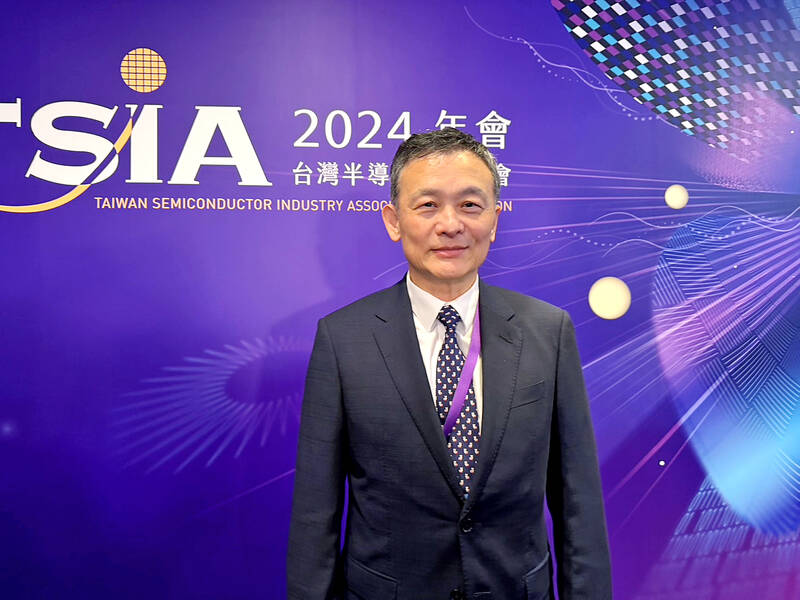The value of Taiwan’s semiconductor output is expected to grow 22 percent year-on-year to more than US$164 billion this year, a top executive from chipmaking giant Taiwan Semiconductor Manufacturing Co (TSMC, 台積電) said yesterday, driven by artificial intelligence (AI) technology and stronger economic growth.
Taiwan is a global power in semiconductors, which have become indispensable in an array of industries, from electronics to wind turbines, and even missiles.
TSMC controls more than half of the world’s output of chips and counts Apple Inc and Nvidia Corp among its clients.

Photo: Vanessa Cho, Taipei Times
Speaking at an industry event in Hsinchu, TSMC senior vice president Cliff Hou (侯永清) said Taiwan’s semiconductor output is expected to reach NT$5.3 trillion (US$164.2 billion) this year, up 22 percent on last year.
The increase is “driven by advancements in AI and gradual economic recovery”, said Hou, who is also the chairman of the Taiwan Semiconductor Industry Association.
“We should accelerate research and development to ensure our standing as an indispensable member of the global semiconductor supply chain,” Hou said, according to Bloomberg news agency.
Hou’s remarks came after Donald Trump’s victory in the US presidential election. Trump has accused Taiwan of stealing the US chip industry, raising fears the sector could be hit with tariffs.
Last month, Trump told podcast host Joe Rogan that Taiwan took away US semiconductor business and jobs. “These chip companies, they stole 95 percent of our business. It’s in Taiwan right now. They do a great job, but that’s only because we have stupid politicians,” Trump said as part of a lengthy interview where he also stated he protected Taiwan from China during his first stint as president.
The incoming Republican president went on to suggest that he could leverage tariffs, not subsidies, to convince companies like TSMC to build and expand chipmaking facilities on US soil, Bloomberg reported.
Hou said yesterday that Taiwan’s chip industry has not received any notification about new tariffs.
TSMC is at the forefront of a generative AI revolution, churning out the world’s most advanced microchips needed to power products made by Silicon Valley.
Surging demand for AI is having a knock-on effect across the entire semiconductor supply chain in Taiwan, Wayne Lin (林偉智), executive vice president at Witology Markettrend Research Institute (智璞產業趨勢研究所), told AFP.
“This expansion contributes to Taiwan’s projected output, along with the traditional peak season for mobile communications toward the year-end,” Lin said.

Intel Corp chief executive officer Lip-Bu Tan (陳立武) is expected to meet with Taiwanese suppliers next month in conjunction with the opening of the Computex Taipei trade show, supply chain sources said on Monday. The visit, the first for Tan to Taiwan since assuming his new post last month, would be aimed at enhancing Intel’s ties with suppliers in Taiwan as he attempts to help turn around the struggling US chipmaker, the sources said. Tan is to hold a banquet to celebrate Intel’s 40-year presence in Taiwan before Computex opens on May 20 and invite dozens of Taiwanese suppliers to exchange views

Application-specific integrated circuit designer Faraday Technology Corp (智原) yesterday said that although revenue this quarter would decline 30 percent from last quarter, it retained its full-year forecast of revenue growth of 100 percent. The company attributed the quarterly drop to a slowdown in customers’ production of chips using Faraday’s advanced packaging technology. The company is still confident about its revenue growth this year, given its strong “design-win” — or the projects it won to help customers design their chips, Faraday president Steve Wang (王國雍) told an online earnings conference. “The design-win this year is better than we expected. We believe we will win

Chizuko Kimura has become the first female sushi chef in the world to win a Michelin star, fulfilling a promise she made to her dying husband to continue his legacy. The 54-year-old Japanese chef regained the Michelin star her late husband, Shunei Kimura, won three years ago for their Sushi Shunei restaurant in Paris. For Shunei Kimura, the star was a dream come true. However, the joy was short-lived. He died from cancer just three months later in June 2022. He was 65. The following year, the restaurant in the heart of Montmartre lost its star rating. Chizuko Kimura insisted that the new star is still down

While China’s leaders use their economic and political might to fight US President Donald Trump’s trade war “to the end,” its army of social media soldiers are embarking on a more humorous campaign online. Trump’s tariff blitz has seen Washington and Beijing impose eye-watering duties on imports from the other, fanning a standoff between the economic superpowers that has sparked global recession fears and sent markets into a tailspin. Trump says his policy is a response to years of being “ripped off” by other countries and aims to bring manufacturing to the US, forcing companies to employ US workers. However, China’s online warriors